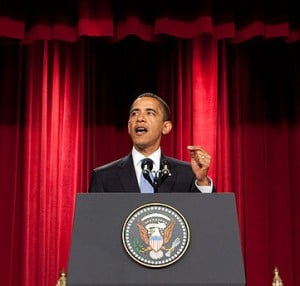 In last night’s pathetic debate between Barack Obama and Mitt Romney, three sentences from Obama stood out to me:
In last night’s pathetic debate between Barack Obama and Mitt Romney, three sentences from Obama stood out to me:
I believe that the free enterprise system is the greatest engine of prosperity the world's ever known. I believe in self-reliance and individual initiative and risk takers being rewarded. But I also believe that everybody should have a fair shot and everybody should do their fair share and everybody should play by the same rules, because that's how our economy's grown.
Obama’s invocation of free enterprise, self-reliance, and individual initiative is obviously at odds with his proposals for government to take over health care, regulate banks and other businesses more oppressively, and aggressively expand government spending and the welfare state.
Obama is typically vague. Which “risk takers” should be “rewarded,” and how much, and by whom, and by what standard? What is a “fair shot” and a “fair share,” and who decides, and by what standard? In what ways should the rules be “the same,” and what rules should be permitted, and by what standard? And how does all of this relate, for instance, to the subsidies for Obama’s crony friends at Solyndra and the like?
Notably absent from Obama’s comments—as from his policies—is any explicit reference to any standard, such as that of individual rights.
There is, however, reference to an implicit standard. The doctrine that “everybody should have a fair shot and everybody should do their fair share” is an indirect version of the doctrine, “From each according to his ability, to each according to his needs.”
Americans should ask themselves how that principle has worked out elsewhere.
Like this post? Join our mailing list to receive our weekly digest. And for in-depth commentary from an Objectivist perspective, subscribe to our quarterly journal, The Objective Standard.
Related:
Image: Wikimedia Commons


![[TEST] The Objective Standard](https://test.theobjectivestandard.com/wp-content/uploads/2017/10/logo.png)









